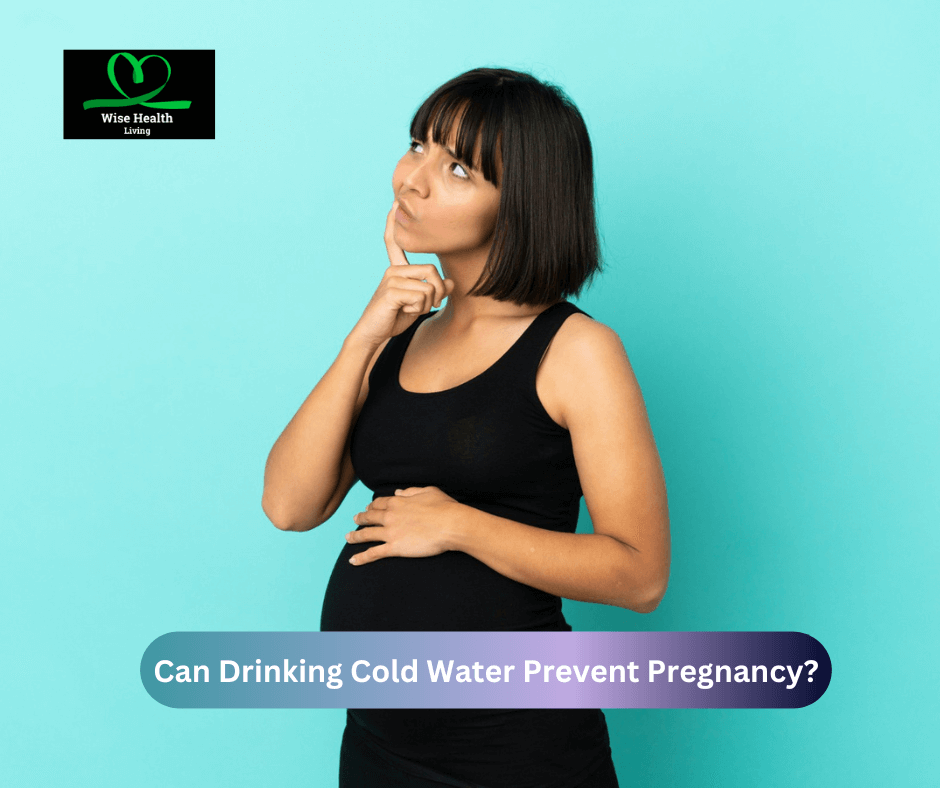Various questions come when one is pregnant; such questions like: “can drinking cold water prevent pregnancy?”. So many myths, so many misconceptions; so many fallacies that will make the average man, not just howl with laughter; but wonder how people will go that far to think up such misconceptions.
One thing has been established though, and that is the fact that many of the people who think up such silly notions are those who are unfortunate enough to end up with an unplanned or unwanted pregnancy.
Those who go around peddling these misconceptions are some who have tried these methods thinking that they are pregnant and have gotten lucky not to be pregnant. They end up thinking -without empirical backing -that their method actually worked; so they go around telling others about it when they are faced with similar problems and expect that things would work as well as they perceive to have worked for them.
To find a true answer to this question, we have to go to the root to find out why things are this messed up.
What is an unplanned pregnancy?
An unplanned pregnancy is mistimed, unexpected, or undesirable at the time of conception.
They also are those pregnancies which either took place while people already had children or happened when having additional children was not desired.
It also involves having a pregnancy which was scheduled improperly, for example, by starting sooner than anticipated.
Understanding unwanted pregnancy is essential for comprehending population fertility as well as the unmet need for contraception, birth control, and family planning. The majority of unwanted births are caused by improper or inconsistent use of contraception, and numerous poor maternal and child health outcomes.
These unintended pregnancies have led to induced abortions, miscarriages, or birth.
It is worth noting that unwanted pregnancies can also result in results, such as live births or miscarriages.
Another useful piece of information is that unwanted or unintended pregnancy may still occur despite using contraception correctly, but are uncommon
Unintended pregnancies and the world
Around 45% of pregnancies worldwide are unplanned, however, rates of unwanted pregnancy vary within sociodemographic categories and between various geographic regions.
Unwanted pregnancies are very common in Nigeria. According to a 2015 research, the frequency of unintended pregnancies was 26.6% while the prevalence of abortions was 21.7%.
In 2010 and 2014, it was predicted to account for 44% of all conceptions or 62 unplanned pregnancies per 1000 women between the ages of 15 and 44.
According to estimates, there are 96 and 89 unwanted births for every 1000 women in low-income countries of Latin America and Africa, respectively, whereas there are 47 and 41 unintended pregnancies for every 1000 women in high-income regions like North America and Europe.
What are those things that cause unplanned/unintended pregnancy?
The following factors are associated with an unintended or unwanted pregnancy in the various parts of the world it happens.
1. Younger sexually active women or girls
Sexually active women, especially those between the ages of 15 and 25, are less likely than women of other ages to take contraception, which increases the likelihood of unwanted births.
2. Unmarried women living with partners
Comparatively to both unmarried no-cohabiting women, women who live with their partners but are not married experience a greater prevalence of unwanted pregnancies.
3. Poor/low-income people
The chance of an unwanted pregnancy is higher for women who are poor and have lower incomes.
4. People with low levels of education/illiterate
Among all educational levels, women with secondary education or less had the greatest proportion of unwanted pregnancies.
5. Non-consentual/abusive sex
Unintended pregnancy may be caused through sexual coercion, rape, or even coerced pregnancy, all of which can occasionally occur in the context of domestic abuse. Contrary to desired pregnancies, unintended pregnancies are more frequently linked to abuse.
Recommended – Can Ampiclox Flush Out Sperm Immediately?
What are the negative effects of unplanned/unintended pregnancies?
Having unwanted or unplanned pregnancies can lead to a lot of problems and these problems are listed below:
1. Missed opportunities for preconception care
2. Late initiation of prenatal care
3. Unintended births
4. Maternal mental health
5. Substance use during pregnancy
6. Increased numbers of pre-term birth and reduced birth weight
7. Relationship stress
8. Adoption
9. Added rates of child abandonment and abuse
10. Decreased bonding with the infant
11. Decreased breastfeeding
12. Maternal deaths
13. Induced abortions
Can drinking cold water prevent pregnancy?
No, drinking cold water does not prevent pregnancy. Unfortunately, many women believe without an iota of doubt that drinking cold water after sex can freeze the sperm deposited in their vagina to death. This doesn’t just end at the cold water, they also believe that hot water after having sex can burn the sperm to death. Some even put in salt in the effort of making the process more potent.
This is blatantly false. If you try to use cold water as a means of contraception, you will be sorry. When used as a method of contraception, hot water will let you down. Science satisfactorily answers the question – can drinking cold water prevent pregnancy.
What then is good to use for preventing pregnancy?
The only sure way one can use to prevent an impending pregnancy is to make use of contraceptive methods.
People can choose from several contraceptive options. The way a contraceptive is used also depends on when it is used. The two primary categories of contraceptive techniques are. The first branch consists of contraceptive techniques used before sex, while the second branch consists of contraceptive methods used after sex.
1. Contraceptive techniques that are used before intercourse
Barrier techniques, hormonal birth control, intrauterine devices (IUDs), sterilisation, and behavioural techniques are all utilised as contraceptives before having intercourse.
2. Contraceptive procedures that are used post-sex
One such name for this technique is an emergency contraceptive. When other traditional techniques have failed or been ineffectively employed, this type of birth control is used to prevent pregnancy following sexual activity.
Emergency contraception is given to women who don’t want to get pregnant but have engaged in unprotected sexual activity on any day of their cycle, on day 21 after giving birth, or on day 5 after an abortion or miscarriage. Both the implantation of a copper intrauterine device and oral contraceptive tablets are suitable emergency contraceptive methods.
There are various variations of emergency contraceptives, including intrauterine devices (IUDs) and emergency contraceptive tablets (ECPs).
Read Also – Benefits Of Bitter Kola Sexually – Everything You Need to Know
What contraceptives can be used before sex?
Contraceptives that can be used before sex include:
i. The sterilisation process
Sterilization, a term used to describe several medical birth control techniques, makes a person sterile on purpose. Both surgical and non-surgical methods can be used to sterilise both males and females. Sterilization procedures are typically difficult or impossible to reverse since they are supposed to be permanent.
ii. Contraceptive techniques with barriers
Condoms, the diaphragm, the cervical cap, the contraceptive sponge, and spermicides are a few examples of this procedure. They physically block or somehow prevent sperm from reaching the uterus to fertilise the egg. Spermicide, a sperm-killing medication, is used with the cervical cap, sponge, and diaphragm to stop conception.
iii. Behavioural birth control techniques
These methods for preventing conception rely on knowledge of the menstrual cycle, male and female reproductive physiology, as well as other relevant subjects, as opposed to employing medications, herbs, devices, or other barriers.
There are two different categories of behavioural interventions: those that are independent of the menstrual cycle (such as abstinence or coitus interruptus) and those that are dependent on the cycle.
iv. Hormonal birth control
Hormonal contraception refers to the practice of using birth control methods that have an impact on the endocrine system. In practically all methods, steroid hormones are employed.
As hormonal contraceptives either include progestin alone or oestrogen and progestin together, they are generally considered to be a safe and reliable method of preventing pregnancy.
v. Birth Control Techniques Using Intrauterine Devices (IUDs)
An intrauterine device (IUD), also known as an intrauterine contraceptive device (IUD or ICD), or coil, is inserted into the uterus to prevent conception. It is a small, typically T-shaped birth control device. One kind of reversible long-acting birth control is the IUD (LARC).
Interesting Read – How To Tighten Your Vagina With Ice
What Contraceptives can be used after sex?
Contraceptives that can be used after sex include:
i. Intrauterine gadgets (IUDs)
Intrauterine devices (IUDs), which are frequently used as a primary contraceptive technique, are occasionally combined with emergency contraception to provide the best results. Nonetheless, the use of IUDs as emergency contraception is extremely uncommon.
ii. Pills for emergency contraception (ECPs)
These medications, sometimes referred to as the morning-after pill or emergency contraceptives (ECs), are used to halt or delay ovulation or fertilisation, two crucial pregnancy stages.
It differs from a medical abortion, which involves administering a chemical regimen to terminate pregnancies throughout the second and even third trimesters.
Postinor 2 is one of the emergency contraceptive medications that we frequently use.
In conclusion,
All these contraceptives go a long way in ensuring one prevents unwanted and unplanned pregnancy and save one’s self from having to think or act out silly answers to silly questions like: “can drinking cold water prevent pregnancy?”
It is also advisable for anyone to understand that abstinence is still the surest way to keep one’s self from getting an unwanted or unplanned pregnancy. One cannot carry a pregnancy when one did not have sex.
It is also advisable for one to ensure that one learns more about these various forms of contraceptives and seek advice from one’s medical expert to ensure that one uses or practices a method of contraceptive that is tailored to meet their needs.



